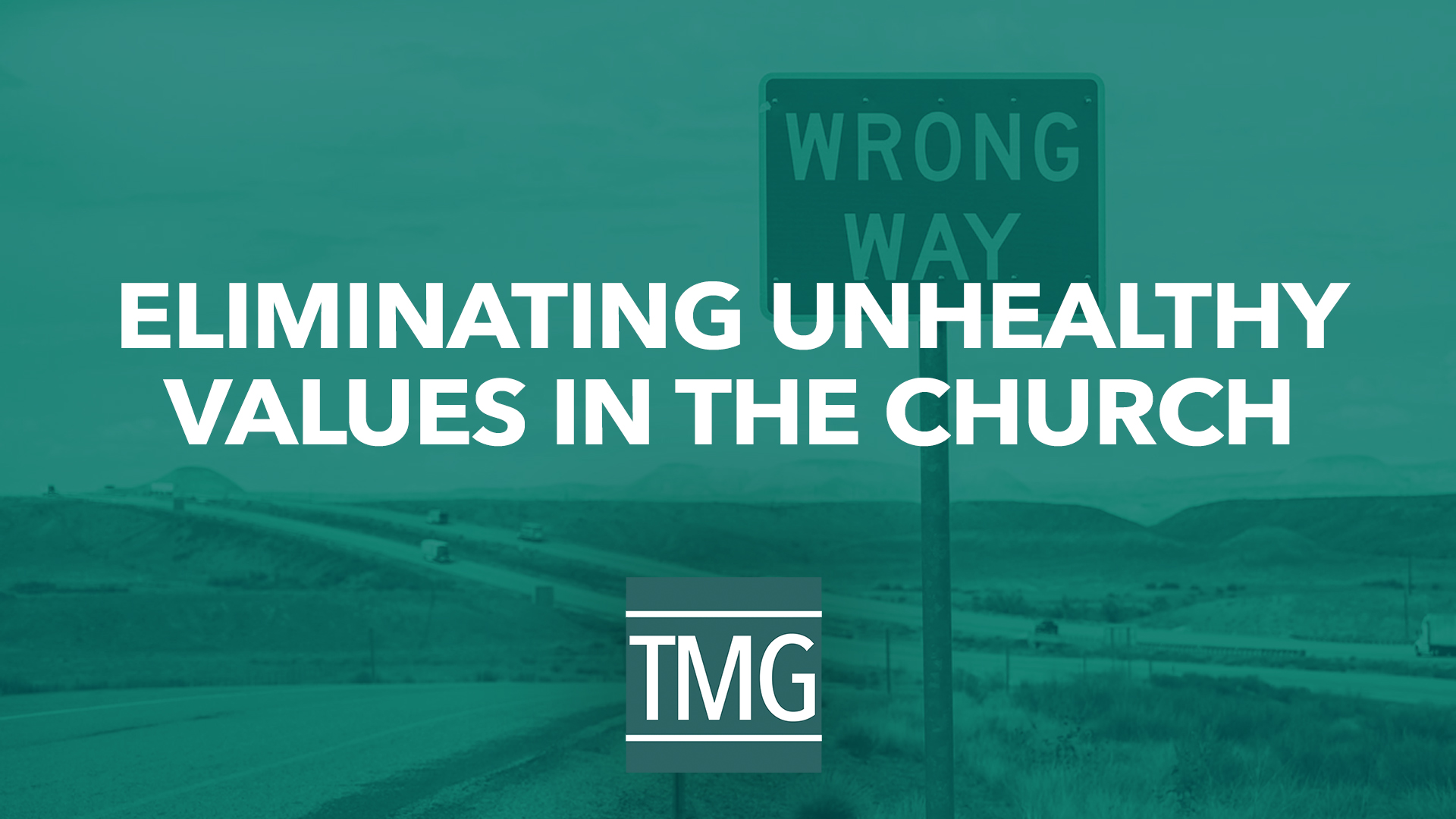Core values are the hidden hand in your church. Your values make decisions for you when you operate out of default. The actual values of your church determine most of the choices you make. The problem is that what you actually value may not line-up with the statements on your website or bulletin.
For this reason, it’s critical to fully understand the role of core values and the types of values (good, bad, and aspirational). You can read more about that here.
If you are honest, your church likely to has a handful of unhealthy values that are negatively impacting the church. Unhealthy values are particularly common in declining churches, but even growing churches can have unhealthy values.
A few weeks ago, while leading a cohort of pastors through our Strategic Envisioning process, one of the pastors asked, “What do we do when we have a dysfunctional value?”
Let’s start with the easy answer to this question: If you have a dysfunctional or unhealthy value, you simply need to stop operating out of that value.
That’s easy to say, but nearly impossible to do! The hard answer is the basis for this article.
Author’s Note: I like to call an unhealthy value that you don’t want to carry with you moving forward an “un-value.” It’s something that you’re actively choosing not to operate from in the future. I’ll use this term as shorthand for dysfunctional, bad, unhealthy values moving forward.
Here’s a three-step process your church can follow to eliminate un-values from your church culture:
Openly Discuss the Un-Value
In Strategic Envisioning, we walk churches through a Values Discovery process– a valuable workshop for identifying good, bad, and aspirational values. A process like this is where your church leadership will likely identify any un-values.
The problem is that only the 12-15 people involved in this process will know the results and be aware of the un-value. It’s the leadership’s job to make the rest of the congregation aware of the un-value.
For example, if your church has an un-value of loving the status quo, perhaps you could do a sermon series on the Israelites who believed the ten spies over Joshua and Caleb. Talk about the dangers of being afraid to take a step of faith. Preach about how God is about transformation, not the status quo. As you talk about it, don’t speak of it in generalities. Share how your leadership has identified “loving the status quo” as an un-value. Addressing an un-value with the whole congregation requires humility and transparency.
You have to openly and widely discuss the un-value. Not just once or in one medium, but many times in many ways. This transparency is your church’s way to signal to the congregation that you recognize who you’ve been, but you’re choosing a new path forward.
The rest of the steps in this process won’t be productive without this public discussion of the un-value, so don’t skip it.
Call Out the Un-Value in Meetings
Calling out the un-value from the pulpit is essential, but it’s even more critical to discuss it from the board room. Don’t wait until the un-value rears its head to bring it up. In fact, at the beginning of the revitalization process, you may want to talk about your un-values at the start of every board and committee meeting.
Your un-values are likely to be the source of inertia in board meetings. Your un-values are liable to be the reason why you might table a decision or endlessly debate. Therefore, if you name them in advance and are on the lookout for them, you can minimize their impact on meetings.
Let’s continue with our “loving the status quo” un-value example. Let’s pretend your senior leadership is considering making a change in Sunday worship planning processes. In the past, the senior pastor and worship leader have planned mostly separately, apart from a few email exchanges. The senior leadership is recommending a new planning system that follows a yearly, quarterly, monthly, weekly rhythm that includes a once-per-week meeting between the senior pastor and the worship leader.
The worship leader might resist this. He’s part-time and likes the control he currently has over selecting music. The idea of an additional meeting and a new voice in his planning is uncomfortable. It would just be able to keep doing what we’ve always done (read: the un-value of loving the status quo).
In the beginning, re-enforce where you’re going in terms of values and what you’re not doing anymore. “We value worship, and we want to create an environment in our worship services that lead people to live in awe and obedience to God. We do this best when our worship services are intentional and excellent. I know it would be easier to do what we’re comfortable with, but let’s be mindful of our ‘status quo’ un-value.”
Set the tone for where you’re going and where you aren’t going. This habit is critical in meetings.
Hold yourself personally accountable to resisting the un-value.
Values (and un-values) do most of their work when you aren’t paying attention. I started this article by calling them the “hidden hand.” It’s true. Your core values pull strings in day-to-day decisions.
If you’re a high-level leader in your church, you have to begin by recognizing and admitting that you’re part of the problem. The un-value exists, in part, because you contributed to it, enabled it, or allowed it. As a result, your church’s un-values pull your strings and guide your decisions if you don’t pay attention.
Be mindful of the decisions you make in-between meetings. Be aware of the language you use in emails and phone calls and social media. Self-awareness is the key to eliminating an un-value from your church culture.
I know that it sounds like a lot of work to eliminate a negative value from your culture, and it is. Eventually, an un-value will go away. Your church can change. You can change. But it won’t happen fast or on accident. It will happen slowly and by mindful intentionality.
Here’s the fun part: having a good strategy or compelling vision was never your church’s biggest challenge. Changing your church’s culture is. If you target un-values, eliminate them from your church culture, and walk-in good, healthy, biblical values, your church will experience radical transformation.
Successful revitalization occurs when you do the right things for a long time; this is no more evident and necessary than in the process of eliminating un-values from your church culture.

Scott Ball is the Vice President and a Lead Guide with The Malphurs Group. He lives in East Tennessee with his wife and two children. (Email Scott).


